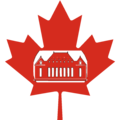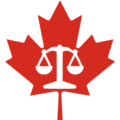Portal:Canada
| Showcase | Contents | Contributing |
Introduction
Canada is a country in North America. Its ten provinces and three territories extend from the Atlantic Ocean to the Pacific Ocean and northward into the Arctic Ocean, making it the world's second-largest country by total area, with the world's longest coastline. Its border with the United States is the world's longest international land border. The country is characterized by a wide range of both meteorologic and geological regions. With a population of just over 41 million people, it has widely varying population densities, with the majority residing in urban areas and large areas of the country being sparsely populated. Canada's capital is Ottawa and its three largest metropolitan areas are Toronto, Montreal, and Vancouver.
A developed country, Canada has a high nominal per capita income globally and its advanced economy ranks among the largest in the world by nominal GDP, relying chiefly upon its abundant natural resources and well-developed international trade networks. Recognized as a middle power, Canada's strong support for multilateralism and internationalism has been closely related to its foreign relations policies of peacekeeping and aid for developing countries. Canada promotes its domestically shared values through participation in multiple international organizations and forums. (Full article...)
Featured article -

The Yukon Quest, formally the Yukon Quest 1,000-mile International Sled Dog Race, is a sled dog race scheduled every February since 1984 between Fairbanks, Alaska, and Whitehorse, Yukon, switching directions each year. Because of the harsh winter conditions, difficult trail, and the limited support that competitors are allowed, it is considered the "most difficult sled dog race in the world", or even the "toughest race in the world"—"even tougher, more selective and less attention-seeking than the Iditarod Trail Sled Dog Race." The originator envisioned it as "a race so rugged that only purists would participate." (Full article...)
Current events
- April 3, 2025 – Tariffs in the second Trump administration
- Multinational car manufacturer Stellantis announces it will lay off 900 workers across five of its U.S. factories and will pause production at assembly plants in Canada and Mexico in response to the tariffs. (Reuters)
- April 3, 2025 – Canada convoy protests
- The Ontario Court of Justice in Ontario, Canada, convicts Tamara Lich and Chris Barber, two leaders of the truck driver protest movement against COVID-19 vaccination in Canada, of criminal mischief. (AP)
- April 2, 2025 – Tariffs in the second Trump administration
- China–United States trade war, 2025 United States trade war with Canada and Mexico
- Exceptions include Canada, Cuba, Mexico, North Korea, and Russia. Canada and Mexico had tariffs placed on them in February, while Cuba, North Korea, and Russia are under U.S. sanctions. (BBC News) (France 24) (India Today)
- The United States Senate votes 51–48 on a non-binding resolution to rebuke and reverse tariffs on Canada, with Republicans Rand Paul, Susan Collins, Lisa Murkowski, and Mitch McConnell voting for the resolution. (NPR)
- March 29, 2025 – Protests against Donald Trump
- Protests are held at Tesla dealerships across the United States, Canada, and Europe to protest against DOGE chief and Tesla CEO Elon Musk's role in the second Trump administration. (Taipei Times) (AP)
Selected panorama -
National symbol -
The Royal Canadian Mounted Police (RCMP; French: Gendarmerie royale du Canada, GRC) is the national police service of Canada. The RCMP is an agency of the Government of Canada; it also provides police services under contract to 11 provinces and territories, over 150 municipalities, and 600 Indigenous communities. The RCMP is commonly known as the Mounties in English (and colloquially in French as la police montée). (Full article...)
Selected vital article -

The History of women in Canada is the study of the historical experiences of women living in Canada and the laws and legislation affecting Canadian women. In colonial period of Canadian history, Indigenous women's roles were often challenged by Christian missionaries, and their marriages to European fur traders often brought their communities into greater contact with the outside world. Throughout the colonial period, European women were encouraged to immigrate to Canadian colonies and expand the white population. After Confederation in 1867, women's experiences were shaped by federal laws and by legislation passed in Canada's provincial legislatures. (Full article...)
Selected picture -
Credit: Benjamin West
Featured biography -

Arthur Lewis Watkins Sifton PC PC (Can) KC (October 26, 1858 – January 21, 1921) was a Canadian lawyer, judge and politician who served as the second premier of Alberta from 1910 until 1917. He became a minister in the federal cabinet of Canada thereafter. Born in Canada West (now Ontario), he grew up there and in Winnipeg, where he became a lawyer. He subsequently practised law with his brother Clifford Sifton in Brandon, where he was also active in municipal politics. He moved west to Prince Albert in 1885 and to Calgary in 1889. There, he was elected to the 4th and 5th North-West Legislative Assemblies; he served as a minister in the government of premier Frederick Haultain. In 1903, the federal government, at the instigation of his brother (who was then one of its ministers), made Sifton the Chief Justice of the Northwest Territories. After Alberta was created out of a portion of the Northwest Territories in 1905, Sifton became the first Chief Justice of Alberta in 1907 and served until 1910. (Full article...)
Did you know -

- ... that Canadian artist Tom Forrestall spent six months painting his own car?
- ... that in one year, a team of Canadian All-Stars twice played against the U.S. college football national champion and came within one point of winning each game?
- ... that Canadian football player Nicholas Dheilly tied his team's single-game sack record in his debut?
- ... that Canadian running back Chase Brown ranked second in American college football with 1,643 rushing yards in 2022?
- ... that there's a Little Canada on Minnesota State Highway 36?
- ... that Canadian cricketer Divya Saxena was accused of obstructing the field in an international match but was ruled "not out"?
- ... that a member of the House of Lords was the principal of a Canadian junior school?
Featured list -
The Northern Star Award, formerly known as the Lou Marsh Trophy, the Lou Marsh Memorial Trophy and Lou Marsh Award, is a trophy awarded annually to Canada's top athlete, professional or amateur. It is awarded by a panel of journalists, with the vote taking place in December. It was first awarded in 1936, named in honour of Lou Marsh, a prominent Canadian athlete, referee, and former sports editor of the Toronto Star. The trophy is made of black marble and stands around 75 centimetres high. The words "With Pick and Shovel" (the name of Marsh's long-running Star column) appear above the engraved names of the winners. The voting panel consists of sports media voters from across the country including representatives from the Toronto Star, The Canadian Press, FAN590, The Globe and Mail, CBC, Rogers Sportsnet, CTV/TSN, La Presse and the National Post. (Full article...)
Main articles
Associated Wikimedia
The following Wikimedia Foundation sister projects provide more on this subject:
-
Commons
Free media repository -
Wikibooks
Free textbooks and manuals -
Wikidata
Free knowledge base -
Wikinews
Free-content news -
Wikiquote
Collection of quotations -
Wikisource
Free-content library -
Wikiversity
Free learning tools -
Wikivoyage
Free travel guide -
Wiktionary
Dictionary and thesaurus





























